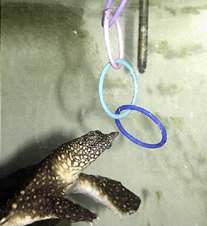It’s all too easy to still be engulfed by the negatives of COVID-19, isn’t it? Even when we don’t have to consult in the car park or wear masks all the time. But there have been some real benefits, and one positive that I’ve found is in my teaching at Cambridge vet school. For years I’ve given roughly the same ophthalmology lectures to our fourth-year students. Maybe there’s a new glaucoma drug or some novel information on breed variations in intraocular pressure to enthral the students with one year, varying it from last, but generally most things stay the same. Not this year though.
Through the pandemic we’ve taught our lectures online, all recorded and available via students’ laptops. So now face-to-face teaching is back do I just go back to the same old lectures? Of course not! All that information is still there online, so I asked the students to watch the lectures and then come to the face-to-face sessions for some case-based interactive discussions. “Here’s a picture of a dog with a red eye,” I said – “what is the key next diagnostic step?” I asked the students to chat with their neighbour before revealing what I thought was the best answer. Or we discussed diagnosing a cat with differently sized pupils: who thinks that it’s Horner’s syndrome, who goes for glaucoma or uveitis and who believes it’s an oculomotor nerve defect? How would we tell the difference? This is the way to teach as far as I’m concerned – not just with a one-way communication where, as we used to say, the information goes from the notes of the lecturer to the notes of the student without going through the brain of either!
Laugh and learn, I say – if it’s amusing you are far more likely to retain the information than if it’s all present and correct but dull
Now, I have to say that some of our lecturers are a good deal ahead of me, using technology to get students to vote on what they think the answer is using their phones. But as far as I’m concerned, if the students are entertained and kept awake you don’t need the most up-to-date gadgets to get them to enjoy the learning experience. Surely that is key to education. Laugh and learn, I say – if it’s amusing you are far more likely to retain the information than if it’s all present and correct but dull.
And, by gum, what a huge amount of knowledge there is to get in over five or six years of study, isn’t there? Not that students need to retain all of it – very few owners are going to come in complaining of a problem in their pet’s voltage-gated sodium ion channels or ask about the pharmacokinetics of the drug you are just prescribing. So, we might ask why we need to teach such minutiae to our students? I do think that understanding the technical foundations of the subjects can be interesting and valuable, but only to a degree. It’s fine if the end result is directed to the treatment of an animal, I guess, but not if the only reason is to pass the end of year exam.
The trouble is that throughout their education these students have been learning to pass the next exam
The trouble is that throughout their education these students have been learning to pass the next exam, whether GCSEs, A-levels or those early exams in their veterinary course. I told the students coming to my latest lectures that if they want the information merely to pass the exam, then the stuff that is already online will do. But if they want to learn to be a better vet, then come along to the interactive sessions. There we will discuss what the best diagnostic step is, or what treatment to use if the owner can’t afford the gold-standard surgical option. And that really is crucial.
Today I had two cases where the owners were told they had to have surgery on their animals. One was told that she was “morally obliged” to spend the £4,000 that it would take to have the operation, while the other was told that her cat was uncomfortable (it wasn’t when I saw it!) and that surgery was essential. In both cases there were clearly other options, with conservative management possible for the first case, and in the second the lesion had resolved itself before I even saw the cat.
All too often now we vets seem to be too keen to extract large amounts of money from owners when a cheaper, more conservative approach might be better
J G Wright, the first veterinary anaesthetist, used to say that every case was an emergency as it might die or get better before you treated it and in neither of these cases could you get payment from the owner. That was a joke back when he said it in 1937 to dear Mary Brancker, CBE, FRCVS, who qualified that year (and used to love telling the story). But all too often now we vets seem to be too keen to extract large amounts of money from owners when a cheaper, more conservative approach might be better for the animals and the owner’s wallet. But perhaps I’d better stop there!










